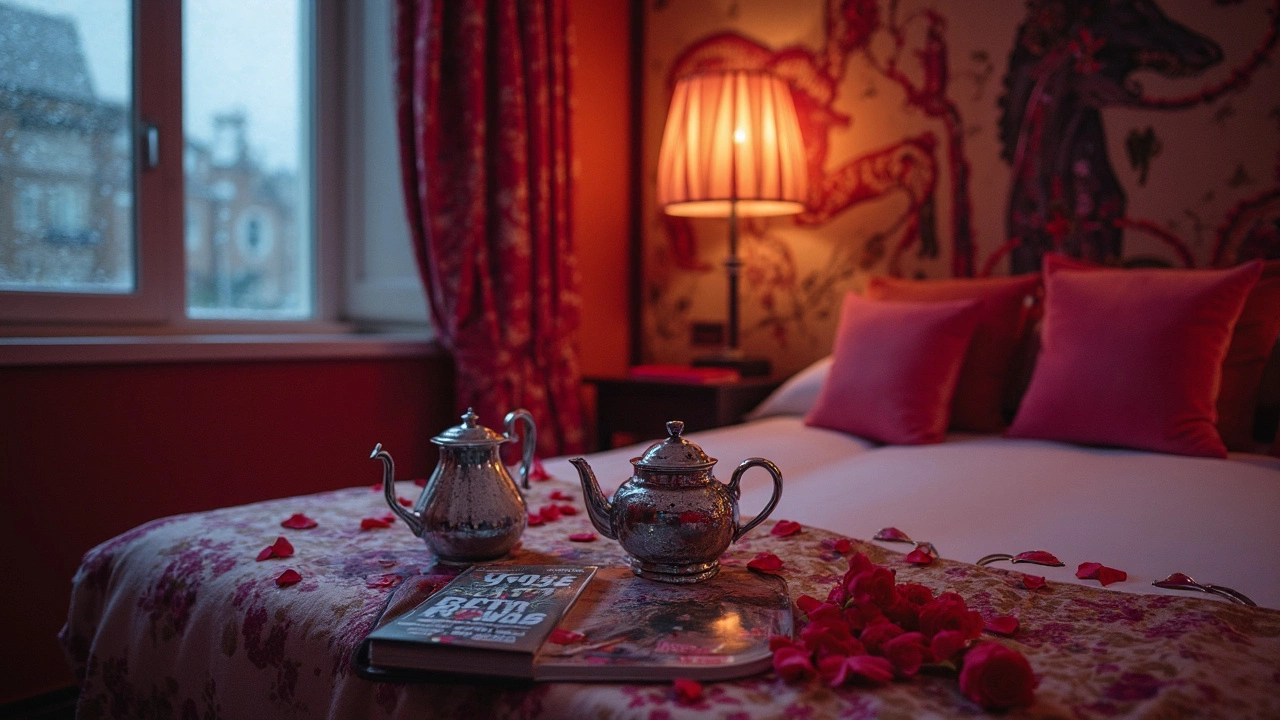What Are Love Hotels Called? Quick Guide to Romantic Hideaways
22 May, 2025Ever heard the term "love hotel" and wondered what people actually call them in different countries? If you’re looking to book a romantic hotel without running into awkward translations or misunderstandings, you’re in the right place. These hotels aren’t just a quirky detail in anime or movies—they’re everywhere, and each spot has its own word for them.
Knowing the right name makes searching way easier. In Japan, they’re called “rabuho,” which is just short for love hotel. In places like Korea, you might hear “motels” or “yeogwan,” though not all of those are strictly for couples. Hop over to Latin America, and you’ll find “moteles” or even “albergues transitorios.” The names change, but the idea’s the same: privacy and a dash of fun for couples.
The cool thing? Many of these hotels really lean into the experience. You’ll find themed rooms, room service through hidden doors, and even touchscreens for checkout—no eye contact required. If travel privacy sounds good to you, these hotels have it down to an art.
- What’s in a Name: How Love Hotels Got Their Titles
- Country by Country: What Love Hotels Are Called
- How Love Hotels Actually Work
- Tips for Enjoying Your Stay
What’s in a Name: How Love Hotels Got Their Titles
The story of love hotels isn’t just about private rooms and quirky amenities—they’ve got some interesting names tied to local history and pop culture. In Japan, these places popped up in the 1960s during a social shift. The term “rabuho” is short slang for “love hotel,” and it started popping up on actual neon signs. The very first modern love hotel, called "Hotel Love," opened in Osaka in 1968, which is basically where the name comes from.
As different countries jumped on the trend, they slapped their own label on it. Check out the table below to see the local names for love hotels in a few different places:
| Country/Region | Local Name | First Popular Year |
|---|---|---|
| Japan | Rabuho (ラブホテル) | 1968 |
| South Korea | Yeogwan / Motel | 1970s |
| Brazil | Motel | 1980s |
| Mexico | Auto Hotel | 1980s |
| Taiwan | Love Hotel (情人旅館) | 1990s |
One thing is clear: the names are almost always straightforward. They tell you what you’re in for, so there’s little confusion. In Japan, “rabuho” is so well known that some locals use it as slang when talking about a secret meet-up spot. In Brazil and Mexico, “motel” doesn’t mean a highway hotel for travelers like in the U.S.; it’s strictly about private time for couples.
To sum it up, each country calls them something a bit different, but the main idea is privacy and convenience for couples. If you’re searching online, plug in the local term—like love hotels, “motel,” or “rabuho"—and you'll get way better results.
Country by Country: What Love Hotels Are Called
So, what name should you punch into your favorite booking app or ask about at a travel desk? Here’s where travel gets interesting. Each country has its own label for places where couples can get some privacy—sometimes you’ll even spot regional quirks inside the same country.
Start with Japan, the king of the love hotels scene. Locals call them “rabuho” (ラブホテル), and they’re super easy to spot—bright neon, themed entrances, and total discretion. These are everywhere, from Tokyo’s Shibuya to tiny towns. Japan alone counts over 10,000 of them, and they rake in billions of dollars per year.
Hop across the sea to South Korea, and you’ll hear two main names: “motels” and “yeogwan.” Motels here don’t mean the roadside type you see in American movies—these are mostly for couples and can range from basic to downright fancy. In Seoul’s Sinchon or Busan's Seomyeon, couples will usually look for “motels” for a short stay. “Yeogwan” (여관) was the old school word, and these days, you’re more likely to see it on budget spots, not the stylish places with LED showers.
In China, “hourly hotels” or “aiqing jiudian” (爱情酒店) is the go-to phrase. They’re not talked about openly but are super common, especially in big cities like Shanghai or Beijing. Hotel websites even let you book by the hour for max flexibility.
Latin America brings another twist. In Mexico, Argentina, and Chile, you’ll hear “motel” (not to be confused with the road motels in the US), and sometimes “albergue transitorio.” These pop up on city outskirts and even inside busy neighborhoods, always with a side of drama—themed rooms, private garages, and even menu ordering without seeing the staff. In 2018, a survey in Mexico City showed nearly 70% of couples aged 18-35 had visited a motel at least once.
Europe has its own low-key take. In Spain, “hostal para parejas” or just “hostal” will be the closest thing. You can also find “hôtels de passage” in France or “Stundenhotel” (hourly hotel) in Germany and Austria. In most of Europe, though, regular hotels sometimes just rent by the hour, so the distinction isn’t always obvious.
| Country | Common Term | Typical Features |
|---|---|---|
| Japan | Rabuho (ラブホテル) | Themed rooms, discreet payment, automation |
| South Korea | Motel, Yeogwan | Short-stay rooms, mood lighting, karaoke |
| Mexico/Argentina | Motel, Albergue Transitorio | Private garages, themed suites, no-face staff service |
| France/Germany | Hôtel de Passage, Stundenhotel | Hourly stays, city center locations, option for anonymity |
Bottom line? If you're chasing a private space, knowing the right term always helps. Use these names in local search engines or with taxi drivers, and you’ll sidestep a ton of confusion.

How Love Hotels Actually Work
If you’re picturing check-in lines and lobby chats, forget it. Love hotels run on privacy and speed, especially in busy cities. Most places don’t even ask for your name. You pull up, and check in from a kiosk, touchscreen, or sometimes over an intercom. Many hotels have covered parking with a private entrance straight to your room to keep things discreet.
Staying for just a few hours? No problem. Booking is super flexible. You can rent a room for a “rest” (usually 1–3 hours) or stay overnight. Here’s how it usually breaks down in Japan, where this idea is huge:
| Option | Typical Duration | Price Range (USD) |
|---|---|---|
| Rest | 1-3 hours | $25-$60 |
| Stay | Overnight (usually after 10pm) | $60-$150 |
Once you’re in, you rarely see hotel staff. You pick your room from a wall of pictures (with the best ones often snapped up first). Everything from lighting to air-conditioning and room service is controlled from your bed—or just a short stretch away. Some places even have vending machines for adult goodies or snacks in-room.
Payment is about as low-key as it gets. There’s usually a machine by your door when you leave, or you pay at a window with a privacy screen. In bigger cities, you might never actually see anyone else, which is the whole point for many visitors. The focus is always on convenience and keeping you comfortable, with a little splash of fun on the side. If you’re searching for a love hotel, expect bold room decor and some playful features, but also a super smooth, private experience every time you book.
Tips for Enjoying Your Stay
Trying out a love hotel can feel a little different if you’ve never done it before. Here’s how to keep things smooth and stress-free, especially if you’re curious or planning a getaway with your partner.
- Do your homework before booking. Peek at online reviews and photos if you can. Not all love hotels are the same. Some are all about quirky themes or high-tech setups, while others are more basic. Booking sites like Agoda, Booking.com, or even Google Maps often include real guest reviews and updated photos.
- Understand the check-in process. Many love hotels, especially in Japan and South Korea, use automated kiosks so you usually won’t need to talk to anyone. These spots focus on privacy—so don’t expect a front desk chat. You’ll often pick your room from a wall of pictures or a touchscreen. If the check-in seems confusing, just take your time and look for staff buttons if you need help.
- Look out for rental and purchase options. Forgot your toiletries? Most love hotels stock things like toothbrushes, razors, and even fun extras like costumes, massage oils, or snacks. Some put amenity kits right in the room or in vending machines.
- Read up on local etiquette. In Japan, for example, you usually pay when you leave, not up front. And don’t expect lots of windows—privacy is the point. Some places have separate entrances or even parking spots with curtains for discretion. If you’re bringing someone who doesn’t want to be seen, this really matters.
- Be clear about pricing. Most love hotels offer two options: "rest" (short stays, usually 1–3 hours) or "stay" (overnight, often after 10 pm). Watch out for extra charges for things like late checkout or extra guests. The fee is usually clear on the check-in screen or printed price list—just double-check before confirming.
Honestly, the best tip is to relax and enjoy the curious little details. Love hotels are made for comfort, fun, and zero judgment, so just let go and have a good time.

 by
by